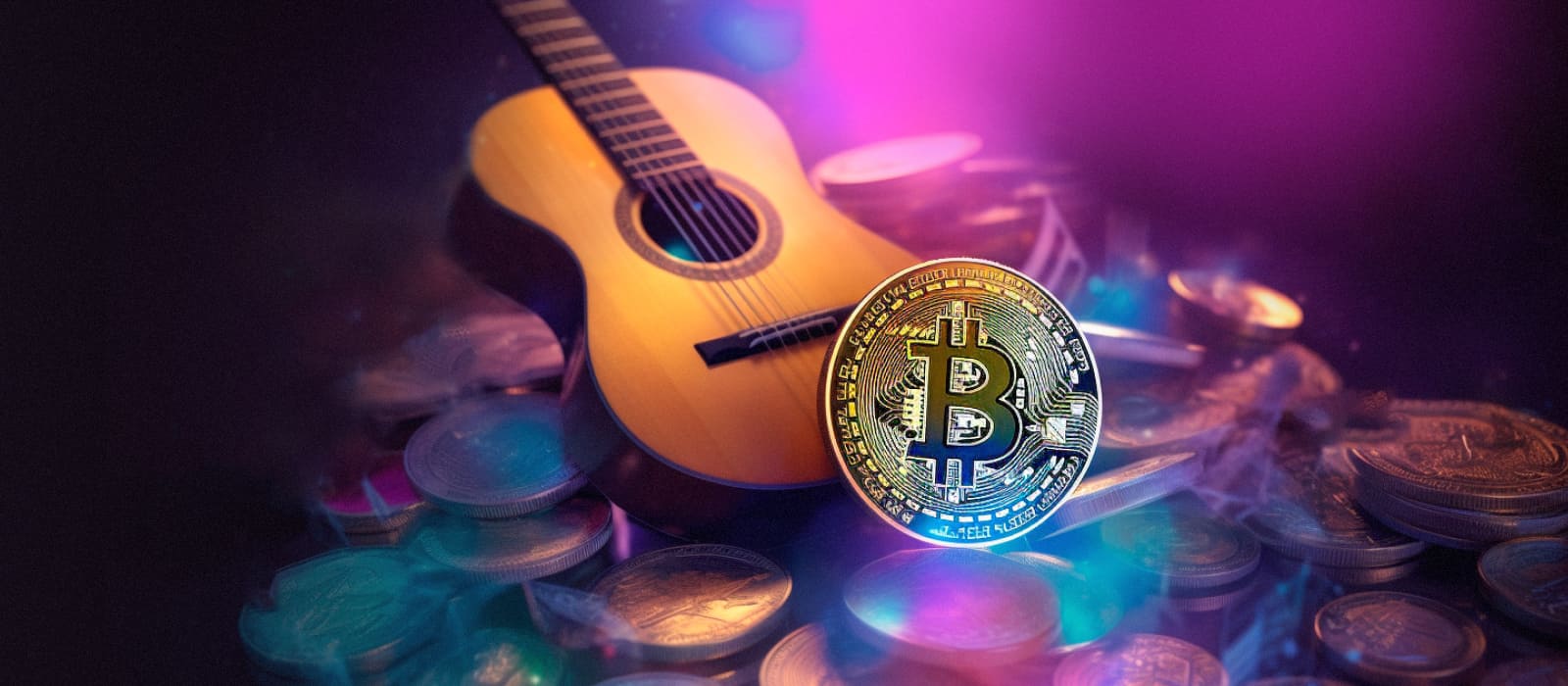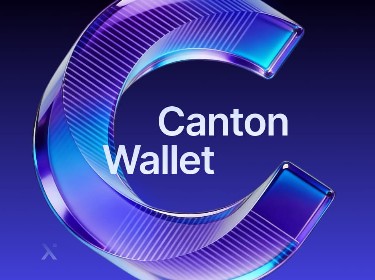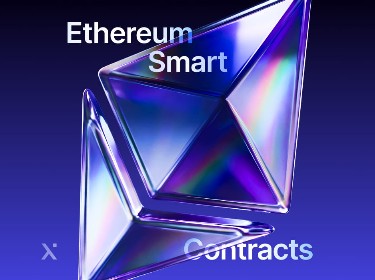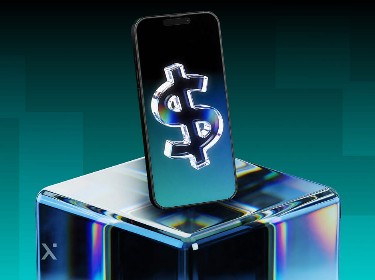A music NFT marketplace is a meeting point for musicians wishing more artistic freedom and control over their work and music lovers looking to discover new creators and support their favorite artists' latest projects.
Although the hype around non-fungible tokens (NFTs) slowed down in 2022-2023, experts predict that the concept will regain its attractiveness in the following years. According to the TechNavio market analysis, the NFT market size is poised to grow at a CAGR of 30.23% between 2023 and 2028, acquiring $68.16 billion worth of value.
But are NFTs only reserved for visual art? Of course not! Any piece of art and asset can be tokenized: pictures, animations, videos, texts, music, even NFT in DeFi — you name it.
And tokenized music is exactly what draws the large attention of the NFT community, with many world-famous musicians releasing their music NFTs: Doja Cat, Eminem, Kings of Leon, Snoop Dogg, and many more. Now, it is anticipated that the global music NFT market size will reach $7.6 billion by 2028.
In this article, we will explore the concept of music NFTs, dive into why they are so attractive for both creators and fans, and share best practices for NFT marketplace software development.
What is a music NFT?
Music NFTs are blockchain-based digital assets that represent ownership and proof of authenticity of a specific piece of music or related content. These tokens are showcased and traded on NFT marketplaces and can be of different types, such as:
- Single tracks
- Albums
- Limited edition releases
- Music videos
- Album/track covers
- Performers’ photos
- Concert tickets
NFTs, stablecoins, security tokens — learn about different types of crypto tokens and how to create them
Why do musicians create NFTs?
![]()
Music NFTs offer several significant benefits for music creators, the most tangible ones being:
More efficient revenue management
First, music NFTs open up a new revenue stream. Musicians no longer need to rely solely on traditional album sales and streaming royalties.
Plus, music NFT launchpad development allows for direct sales between creators and fans, thus reducing the need for record labels, distributors, and other intermediaries who traditionally take a cut of the artists’ earnings. By eliminating these intermediaries, musicians can retain a larger portion of their sales revenue.
Music NFT marketplaces also help artists keep better track of royalties. A musician can decide on the royalty percentage and have automatic payments thanks to smart contracts.
Faster music releases
It takes up to several days to post music on streaming services, for example, five business days to have a Spotify release. This is due to quality checks, licensing and rights verification, and compliance with the platform’s specific requirements.
In contrast, NFT marketplaces allow users to mint and release a music NFT much faster, with the token creation and listing process usually taking no longer than an hour. This not only benefits the artist in terms of quicker revenue generation but also satisfies fans’ desire for new content.
Ownership protection
The creator’s details are embedded into the token and can’t be altered. While digital files can be copied, the metadata ensures that only the tokenized version represents the original piece. This helps to prevent unauthorized replication and distribution of copyrighted material, as copies do not carry the same verified creator information or ownership rights.
Discover WatchDog — a solution helping users to identify and prevent the infringement of their intellectual property in Web3
More creative freedom
With a direct-to-fan model of music NFTs, artists have more freedom to express their creativity, not restricted by the constraints often imposed by record labels or other industry entities. For example, they can create and share content that is more personal and authentic to their artistic vision. This could include exclusive tracks, experimental compositions, or unique collaborations.
Web3 promotion opportunities
Music NFTs empower creators to spread their work across Web3 platforms, such as blockchain-based games and metaverses. This allows musicians to reach out to new audiences.
Why do fans purchase music NFTs?
Music lovers also benefit from NFTs as they offer new ways of engagement with the music and artists they adore. Here’s how:
Ownership of unique content
For fans, owning a music NFT is not just about having a unique item but also about the emotional connection to the artist and the music. It’s a digital token that represents their passion and support for the artist’s work.
Besides, music NFTs often come in limited editions, making them exclusive. This rarity adds to their value, both in terms of collectability and prestige among fans and music collectors.
Meet CheckNFT.iO — an AI-powered platform that allows users to analyze NFTs and make informed trading decisions
Resale opportunities
Music NFT holders can resell their tokens, potentially at a higher value. This adds an investment aspect to music NFTs, allowing fans to potentially earn a profit while supporting their favorite artists.
Access to exclusive experiences
The NFT technology allows creators to enhance tokens with unlockable content — additional perks a buyer gets after the purchase. Examples of such content may include physical and virtual collectibles, discount codes, invitations to online and offline events, access to private communities, and more.
Direct support of creators
Money raised through fans engaging with music on streaming services or buying physical albums does not go directly to creators. They are shared with record labels or music publishers, who take a percentage before passing the remaining royalties to the artists.
By purchasing tokenized compositions on music NFT marketplaces, fans pay directly to musicians, thus providing them with a more sustainable and fair compensation for their work.
Showoff opportunities
Music NFTs can be collected and displayed in virtual spaces, enabling collectors to establish their digital gallery and showcase their passion for unique art pieces. This display will not only serve as a personal statement of their musical taste but also create opportunities for social interaction and community building among like-minded enthusiasts.
What music NFT marketplaces are there?
Music NFTs can be traded on specially dedicated NFT marketplaces and general-purpose platforms, for example, OpenSea and Blur.
In this section, we will examine the first category which encompasses such music NFT marketplaces as Sound.xyz, Onlymusix, and OneOf.
Let’s take a look at each platform.
Sound.xyz
Sound.xyz is a music NFT marketplace that allows music creators to spread their works and monetize them more innovatively and comfortably.
At the time of writing, Sound.xyz has 2,555 artists and 5,500 songs represented on the marketplace. Over two years after the platform’s release, Sound.xyz helped artists earn more than $6 million.
The platform supports Ethereum and its Layer 2 rollups: Optimism and Base. If the artists choose to mint their music NFTs on Optimism and Base, they will not have to pay any fees. However, they are responsible for paying a gas fee when uploading to Ethereum Mainnet. Meanwhile, collectors are charged a fee of 0.000777 ETH per edition purchased.
Besides, Sound.xyz does not take any fees from the artists, with 100% of primary sales revenue and 100% of royalties from secondary sales going directly to the token creator.
Another perk of this music NFT marketplace is the ability for token holders to add a public comment at a specific timestamp of the track. However, this comment can be altered if the NFT is transferred to a different collector.
Read about the top NFT marketplaces in our detailed overview
Onlymusix
Onlymusix is an NFT marketplace dedicated solely to music and music-related items, such as album artwork and gifs.
Token creators can set the royalty fee, which is 10-20% of the NFT’s price. Additionally, creators can distribute their earnings among multiple wallet addresses, deciding the percentage of revenue each will receive. The platform itself takes 5% on every transaction.
Onlymusix extends its services to music labels, enabling them to manage their artists’ tokens. However, the artists themselves are recognized as the creators and owners of these NFTs.
Furthermore, the platform supports POAPs, short for Proof of Attendance Protocols. These are free NFTs that users can claim and collect to prove their attendance at a particular event.
Onlymusix has a strong emphasis on eco-friendliness which is proven by using a carbon-neutral Polygon network. This sustainable approach is further enhanced by the platform’s collaboration with the Forestmatic project, which plants a tree for every NFT created on the marketplace.
Take a look at Circularr — a recycle-to-earn project powered by the Ripple blockchain
OneOf
OneOf is a music NFT marketplace that supports Tezos and Polygon networks. The platform aims to make digital collectibles accessible to a wide audience, including non-crypto-savvy users. For example, the listed tokens can be purchased with various payment methods, including debit and credit cards, crypto, or Marketplace credit.
OneOf tokens are divided into five tiers that reflect their rarity and value: Green, Gold, Platinum, Diamond, and OneOf.
NFT creators receive a 10% royalty on every subsequent sale of their tokens. In addition to this, the platform offers a dedicated program to assist emerging artists and provide artistic, financial, and promotional support.
What monetization potential lies in the creation of a music NFT marketplace?
As music NFTs are gaining momentum, it may be a good business decision to launch your own music NFT marketplace. Such a project has several monetization options, including:
- Transaction fees — you can charge a small percentage fee on every transaction (buying, selling, bidding) made on the platform.
- Listing fees — you may decide to take a fee from creators for listing their music NFTs on the platform. This can be a fixed fee or a percentage of the sale price.
- Premium services — you can offer paid premium services like enhanced visibility for listings, personalized artist pages, or advanced analytics.
- Memberships or subscriptions — your users may pay for exclusive benefits, such as early access to new releases, discounts on purchases, or special events on a membership or subscription basis.
- Royalty sharing — you can retain a portion of artists’ royalties in exchange for managing and tracking transactions.
- Advertising and collaborations — your marketplace can generate revenue through advertising and collaboration with music brands, event promoters, and relevant projects.
Launching a music NFT marketplace: best practices
To make it easier for you to navigate the process of NFT music marketplace development, our well-versed blockchain experts have come up with a list of 5 best practices. These include:
1. Comprehensive market research and analysis
Do thorough research on the market landscape and your potential competitors to understand the current trends and consumer preferences. With this data, you can analyze the strategies, strengths, and weaknesses of your competitors to develop a unique value proposition that will set your music NFT marketplace apart.
To make sure you cover all the vital research aspects, we recommend you seek assistance from experienced research and development specialists.
2. Adherence to legal and regulatory requirements
To avoid having troubles with legal and regulatory requirements when creating a music NFT marketplace, it’s essential to proactively engage with legal experts who specialize in blockchain technology, digital assets, and intellectual property. This way, you will ensure that your platform adheres to current laws and is prepared for potential changes in regulations.
Additionally, establish robust protocols for verifying the authenticity and ownership of music assets before they are tokenized and sold as NFTs.
It’s also important to develop a clear and transparent policy regarding royalties, ensuring that artists receive fair compensation for their work.
Stay informed about the MiCA regulation — a new framework for crypto assets control in the EU
3. Emphasis on scalability and performance
Your music NFT platform should be able to handle transactions quickly and efficiently and be designed to scale effectively as your user base expands. These aspects depend on the blockchain your marketplace will run on.
There are several performant blockchains you can consider, such as Ethereum, Polygon, Solana, Arbutrum, etc. It’s a wise practice to review and compare the characteristics and capabilities of each blockchain and make a data-driven decision on which network best aligns with your requirements and goals.
4. Security as a priority
Ensuring robust security measures is critical to protect your music NFT marketplace from cybersecurity threats like hacking, fraud, and data breaches.
Since smart contracts will perform the majority of operations on your platform, they must be fault-free. This implies that rigorous testing and smart contract audit are a must.
You should also implement strong authentication mechanisms, such as two-factor authentication (2FA) to secure user accounts and access control measures to restrict unauthorized access to sensitive data and functions.
Plus, stick to strong and up-to-date cryptographic standards and algorithms to safeguard sensitive data both in transit and at rest.
It’s essential to have an incident response plan in place. This empowers you to quickly tackle any security incidents, thereby reducing potential harm to both your infrastructure and your reputation.
5. Seamless user experience
Focus on providing a seamless and user-friendly UI/UX for both creators and buyers. This involves designing a platform interface that is intuitive, easy to navigate, and at the same time eye-catching.
For token creators, provide clear guidelines and tools for creating and listing their music NFTs. Ensure that the process of setting up royalties, pricing, and other details is as streamlined as possible.
For buyers, make the browsing, bidding, and purchasing experience smooth and enjoyable. Implement search and filter tools to help them easily find the music they are interested in.
On top of that, integration with the most popular crypto wallets, such as MetaMask, Coinbase Wallet, and Trust Wallet, is very important. This will allow users to easily connect their existing wallets to your NFT marketplace.
Our design team creates UI/UX that not only catches the eye but is also a breeze to navigate and use
6. Thought-out marketing
Do not neglect marketing strategy as no matter how sophisticated your music NFT use case is, what is the point if no one uses it?
Tailor your marketing messages to resonate with the interests and needs of music creators and fans. Utilize a mix of digital marketing techniques including social media marketing, content marketing, email campaigns, and influencer partnerships. These channels can effectively spread awareness and engage potential users.
Participate in and sponsor music and tech events to increase visibility and network with potential users and partners. Collaborating with artists and music industry influencers for platform promotion can also be highly effective.
7. Continuous improvement and upgrade
The NFT market is continually evolving, so, to stay competitive, it’s essential to consistently track the latest trends and incorporate updates and enhancements into your platform.
Stay engaged with your user community through communication channels, forums, and social media. You can leverage customer sentiment analysis to derive actionable insights.
Conclusion
As new types of NFTs, such as tokenized music, gain popularity, it becomes increasingly evident that the NFT market is resilient and continues to evolve and mature despite various industry challenges.
Mastering the specific technical and community-focused challenges of this niche is where focused NFT art marketplace development excels.
The increasing popularity of music NFTs highlights a growing awareness of how blockchain and non-fungible tokens can innovate and transform traditional industries.
Thinking of launching your own music NFT marketplace? We will be happy to assist you! Our team has extensive expertise in NFT development, having delivered marketplaces of various specifics: restaurant, ASMR, video, and even opal trading!
Contact our blockchain company and share your idea — we will make sure to help you every step of the way, from feasibility evaluation and strategic planning to quality assurance and post-launch support.




